Case studies on promoting PPIF at the national level
Government initiatives
Georgia and the Ramsar Convention on the Conservation of Wetlands
-
Armenia and the NGO contacts database
-
France and the Grenelle Environmental Debates
-
France and Envilogue
NGO initiatives
NGO contacts database – EPAC (Armenia)
Case studies on promoting PPIF at the international level
International forum initiatives
Workshop on access to information and public participation in water and health related issues – Water and Health ProtocolNGO seats on the bureau – Environment and Health Process
Rotating leadership of major groups - CSD
Government initiatives
- NGO representatives on official delegation
- Coordinating meetings with civil society before and during the conference
NGO initiatives
- "Below 2C bulletin"
- Case studies on assessing PPIF
- Study on Austria’s practice regarding PPIF – Justice and Environment and Oekobuero, funded by Austrian Ministry of Environment
- Study of French negotiators’ practices regarding PPIF – France
- Access to information and public participation in the development and implementation of the European Neighbourhood Policy – RAC “Society and Environment”, Ukraine
Compendium of case studies of good practice on promoting public participation in international forums
Introduction
Through paragraph 2(c) of decision III/4, the Meeting of the Parties requested the Task Force to prepare a compendium of case studies of good practice on promoting public participation in international forums (PPIF) for broad dissemination.
The compendium is intended to be a “living resource” and to be periodically updated to incorporate new case studies of good practice.
The compendium is structured around three main themes. The first theme includes case studies of good practices in promoting PPIF at the national level. The second theme covers case studies of good practices in promoting PPIF at the international level. The third theme consists of case studies of good practices regarding assessing the quality of PPIF. All three themes include case studies of government initiatives, NGO initiatives, and in some cases, the two working together. The second theme also includes case studies of initiatives taken by international forums themselves.
Open invitation for further case studies
The case studies included in the compendium to date are drawn from the work of the Task Force over the 2008-2011 intersessional period. However, in keeping with the compendium’s status as a “living resource”, new case studies of good practice in promoting public participation in international forums are always welcome. If you have a case study that you would like to include in the compendium, please send a short summary (under 800 words) to [email protected], indicating in the subject line that it is intended as a contribution to the compendium.
Case studies on promoting PPIF at the national level
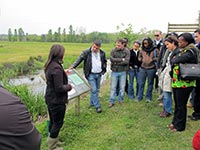 Government initiatives
Government initiativesGeorgia and the Ramsar Convention on the Conservation of Wetlands
In collaboration with the Ramsar Convention secretariat, the Ministry of Environment Protection and Natural Resources of Georga designed an awareness campaign around the 41st meeting of the Standing Committee of the Ramsar Convention (Georgia, April 2010). Information was disseminated several months before the conference to raise public awareness regarding the importance of wetlands. All NGOs expressing interest were able to attend the conference and some more active NGOs participated in the awareness-raising campaign itself. There was advertising for the conference on the main TV channels and a special film was prepared illustrating the importance of wetlands. Lectures and seminars for youth and students on wetlands protection were held as well as an exhibition of children’s drawings about wetlands. The government of Georgia provided discounts on hotels and free transport in the region for participants in the meeting, including NGO
 Armenia and the NGO contacts database
Armenia and the NGO contacts databaseThe Armenian Ministry of Environment is implementing a project, with the assistance of the German government, to create a database to identify NGOs to be invited to consultations regarding environmental planning, policy and decision-making. The database will include NGOs’ main purposes and objectives, their areas of work, their donors etc.
France and the Grenelle Environmental Debates
The Grenelle Environmental Debates was a new political consultation process launched by France’s President in mid 2007. It resulted in unprecedented mobilization by civil society, with hundreds of proposals; 19 regional meetings with over 16,900 participants, 8 internet forums with 11,000 contributions; six working groups and roundtables and 268 commitments, of which 88% have been implemented. As well as national commitments, the process included commitments regarding three international processes – the climate negotiations, the 2010 year of biodiversity and the Rio +20 Conference in 2010. The Grenelle Committee meets regularly to follow up on the commitments.
In 2008, the French government launched the ENVILOGUE extranet environmental platform with the aim to enhance civil society involvement in environmental decision-making at the European Union (EU) and international levels. Other initiatives by the French government in the lead up to the Copenhagen conference included meetings with NGOs and selecting a youth delegation of four French students to take part in governmental meetings, EU coordination meetings and preliminary debates. Regarding media, the French government also set up a radio frequency for information regarding the climate change negotiations, and published many articles, photos and videos.
NGO contacts database – Environmental Public Advocacy Centre (Armenia)
The Armenian NGO Environmental Public Advocacy Centre (EPAC) also has its own database of NGOs indicating their areas of expertise which EPAC uses when identifying invitation lists for events or other opportunities for input.
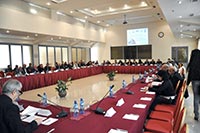 National forums before and after international meetings - “Khazer” Ecological and Cultural NGO (Armenia)
National forums before and after international meetings - “Khazer” Ecological and Cultural NGO (Armenia)In the lead up to the Copenhagen conference, “Khazer” Ecological and Cultural NGO (Armenia) organized a national ecological forum and other meetings with representatives of different government departments, public institutions and NGOs, to discuss climate change issues and to contribute to Armenia’s position for dealing with climate change problems. Following the Copenhagen conference, “Khazer” Ecological and Cultural NGO organized a second national conference to discuss the Copenhagen conference and its outcomes. “Khazer” Ecological and Cultural NGO has also conducted research on the effects of the many new hydro-electric power stations that have been built as a result of “clean energy” policies, including effects on endemic species of fish, and the local people who rely on them for their livelihood. The Armenian government is now looking into this issue, with the involvement of civil society.
International forum initiatives
Workshop on access to information and public participation in water and health related issues – Water and Health Protocol
On 15-16 June 2010, the UNECE and WECF organised a workshop on access to information and public participation in water and health related issues in Bucharest for Parties to the Protocol and NGOs. It is intended that a guidance paper on public participation will be developed from the outcomes of the workshop. A proposal was also made at the workshop to collaborate with the Aarhus Convention on public participation. Further information on the workshop is available at: http://live.unece.org/env/water/meetings/public_participation_protocol_workshop.htlm
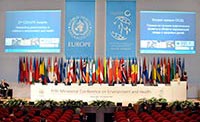 NGO seats on the bureau – Environment and Health Process
NGO seats on the bureau – Environment and Health ProcessThe Environment and Health Process was launched in 1989 and since then ministerial conferences have been held every five years with many ways for civil society to be involved. For example, there are two seats on the Bureau for civil society (one environmental NGO and one health NGO representative, both representatives are elected). For further information see: http://www.euro.who.int/en/what-we-do/health-topics/environmental-health/european-process-on-environment-and-health
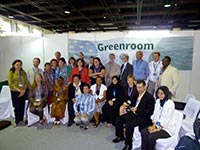 Rotating leadership of major groups - CSD
Rotating leadership of major groups - CSDThe involvement of civil society in the CSD is managed through the 9 major groups of Agenda 21 (women, children and youth, indigenous people, NGOs, local authorities, trade unions, business and industry, scientific and technological community, farmers). Participation rights for civil society include speaking slots, seats in round tables with ministers, the right to comment on the agenda and the right to nominate people from that group. A key challenge is the need for each major group to be self-organised. Ideally, this should be democractic, through the election of the key representatives. However, this does not always happen and issues of representativeness may arise. The “women” major group now has a rotating system in place so that every two years another NGO or group of NGOs will take the lead in accordance with the issues of that CSD cycle. This system is reported to encourage dynamism.
NGO representatives on official delegations
For a number of years, Italy has included an NGO representative on its climate change delegation. The NGO representative is duly engaged in preparatory meetings, before EU coordination meetings take place, and in the day-to-day work of the delegation during the negotiations' rounds. The representative also participates in NGO meetings on key topics, bringing back views and expertise from the NGOs' community, and so the government delegation has the possibility to benefit from this input.
Coordination meetings with civil society before and during the conferences
The Austrian climate change delegation has had a practice of organising daily meetings with civil society during UNFCCC conferences regarding what had happened that day, and what will happen the following day.
NGO initiatives
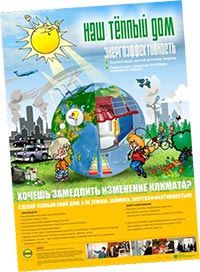 “Below 2C” bulletin
“Below 2C” bulletin A group of Russian NGOs began publishing the “Below 2C” bulletin before the UNFCCC CoP-14 in Poznan (December 2008). The Russian –language bulletin has two main functions: to inform the public and mass media about the international climate negotiations and to promote the NGO climate position. The bulletin is presently produced by representatives of a number of Russian NGOs involved in the UN climate talks. Due to interest from civil society from other regions, an English version of “Below 2C” was published during the CoP-15 in Copenhagen. In addition to the bulletin, there is now also a “Below 2C” blog, http://below2.ru The creators of “Below 2C” note that Russian-speaking government delegates have recognized the bulletin’s importance and now engage in dialogue with the NGOs involved. See:http://below2.ru
Case studies on assessing PPIF
Study on Austria’s practice regarding PPIF – Justice and Environment and Oekobuero, funded by Austrian Ministry of Environment
In 2009, Justice and Environment and Oekobuero (Austria) undertook a research project to assess Austria’s practice regarding PPIF. The project was funded by the Austrian Ministry of Environment and was intended to raise awareness of the Almaty Guidelines in Austria and to develop recommendations for the better implementation of the Guidelines in the future. It included interviews with various Austrian focal points in the Ministry of Environment and the Ministry for Foreign Affairs and Austrian NGOs regarding various international forums. The outcomes of the research were presented at a stakeholder workshop which also developed recommendations for practitioners. The results of the project were distributed by newsletter and published in an Austrian environmental science journal.
The study generated a number of recommendations for how PPIF might be improved, including:
(a) International forums differ in their openness to public participation with some being relatively closed to NGOs and the public. If Aarhus Parties include NGOs in their national delegations to such forums, this might initiate a change in the culture of these forums, and other countries may start to follow suit.
(b) The flow of information is a two way street. NGOs working on international forums often have good contacts with NGOs in other regions, and are able to share useful information with the government.
(c) Officials who adopt an open approach to PPIF should share their experiences with officials working in other international forums.
(d) NGOs would like procedures and practices regarding PPIF to be more formalised, so that they do not depend on the will of the particular ministry or even individual official involved. This might be in the form of rules or guidelines at the national level.
(e) With respect to access to information, early proactive distribution of information is required, eg through websites, newsletters (either electronic or hardcopy). It is also important to disseminate regular information on intersessional issues, e.g. through civil society briefings. Ministries should post at least basic information about the international forums in which they participate on their websites, with links to the websites of the international forums themselves.
(f) Regarding public participation, NGOs would like early information as to upcoming events and issues to be discussed or decided. They would like governments to include them in coordination meetings before and during the meetings of international forums. By way of example, at UNFCCC CoP-15 (Copenhagen, December 2009), Austrian officials would meet with NGOs each day. In general, they would like to be included in national delegations for international delegations. Financial support for NGOs is an important prerequisite to their participation. Better access to EU coordination meetings is considered key by European NGOs.
Study of French negotiators’ practices regarding PPIF – France
In 2007, the French Ministry of Ecology and Sustainable Development and Planning (MEDAD) undertook a study to assess negotiators’ practices regarding public participation in international decision-making processes and to compare NGOs’ and the focal points’ perceptions on this issue. The study, inter alia, considered:
- The conditions under which French negotiators and delegations organise public participation in their preparation of French positions;
- The conditions under which France, when present in international environmental bodies, ensures that the Aarhus principles on public consultation are applied;
- The extent to which members of the French public feel they effectively contribute to
the work of international bodies.
The study’s findings were drawn from 29 interviews (22 focal points and 7 NGO/ private
sector associations). The study’s findings concluded with a number of recommendations regarding possible enhancements to promote access to information and public participation in international forums by France.
The study found that France has a key role in the promotion of public participation in international bodies and should do more to encourage it. Focal points and civil society representatives both recognised that greater formalism is required in the State/civil society relationship. Collaboration should become the rule rather than the exception. Possible improvements during the preparation of the national position include:
a) Communicating a schedule to the public regarding the different stages of international processes to give a precise framework for dialogue;
b) Making public consultation processes more systematic within appropriate time-frames so that the public representation can adopt a more constructive approach with fuller information on positions to be defended by the French delegation. In this respect, the representatives of civil society agreed on the importance of allocating more resources to MEDAD;
c) Developing in-depth consultation between delegations and the public to enable proposals on new subjects going beyond simple reactions to documents drafted by the secretariats of the Conventions;
d) Guaranteeing that the results of consultation procedures are taken into account in a way that goes beyond the barriers of formal consultation;
e) Carrying out consultations with a large number of public representatives and giving credit to alternative expert analyses proposed by the public during consultation;
f) Making it clearer to the public the responsibilities of the different ministries (in particular, the ecology ministry, MEDAD, and the foreign affairs ministry, MAEE) so as to improve working methods and resources. To this end, a “French inter-ministerial coordination secretariat” could be set up. This would allow relations with the public to be co-ordinated so as to prepare international milestones in a regular, properly-monitored manner. Also, to ensure improved visibility of the final national position after consultation, to ensure high-quality monitoring and participation during the later stages of the decision-making process.
As a corollary of successful public participation, possible improvements to access to information and communication are as follows:
a) Adopting a more “proactive” attitude to communication, in particular for conventions concerning relatively technical themes or targeting the populations directly concerned.
b) Building financial capacities (in order, for example, to promote transversal communication between the various conventions), and human resources (with a view to establishing an active relay of information, ensuring its quality and improving the clarity and accessibility of mechanisms used);
c) Highlight and promote the role of NGOs in disseminating information to the general public on the themes and challenges of major international negotiations. In this respect, some representatives of civil society recommend more aid to NGOs, for example by continuing to support tax measures which promote NGO membership.
To promote public participation during international meetings, the following improvements could be considered:
a) Improve timing of receipt of preparatory documents sent by convention secretariats;
b) Rethink forms of NGO funding and look into the possibility of creating a fund to finance French NGO work internationally, in particular to cover travel;
c) Get civil society representatives more involved in the follow up to international meetings.
The study is available here
Access to information and public participation in the development and implementation of the European Neighbourhood Policy – RAC “Society and Environment”, Ukraine
In 2008-2009, the NGO "Society and Environment" (Ukraine), with partner organizations from Armenia, Azerbaijan, Georgia and Moldova, undertook country assessments of the implementation of the environmental dimension of a number of national Action Plans agreed between the EU and neighbouring countries under the EU’s European Neighbourhood Policy (ENP). The assessments, inter alia, considered the extent to which access to information and public participation was ensured in the development and implementation of the ENP. For example, in respect of its country assessment of Ukraine, the study identified a number of deficiencies with respect to both access to information and public participation regarding both the original Action Plan, in place until 2009, and the more recent Association Agenda and Association Agreement which replaced it.
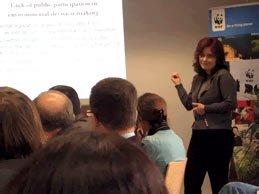 The study also looked at access to information and public participation regarding the European Neighbourhood and Partnership Instrument (ENPI) (the framework for planning and delivering EU financial assistance to neighbouring countries). With respect to Ukraine, the study found there is limited access to the programming documents and no data is available to show what the financial assistance received was spent on. Key documents are not available in Ukrainian language. While there were some opportunities for the public to participate in the mid-term review of the Country Strategy Papers and regarding the National Indicative Programme 2011-2013, there were no opportunities for participation regarding the annual action programs or to monitor the programming process. Overall, the study concluded that there is a need for increased awareness and more dialogue between the EU, Eastern ENP countries and NGOs regarding the ENP and ENPI. The study concluded that further opportunities for public participation were needed in the adoption, implementation and monitoring of the ENP as well as greater transparency in the planning, implementation and monitoring of the ENPI.
The study also looked at access to information and public participation regarding the European Neighbourhood and Partnership Instrument (ENPI) (the framework for planning and delivering EU financial assistance to neighbouring countries). With respect to Ukraine, the study found there is limited access to the programming documents and no data is available to show what the financial assistance received was spent on. Key documents are not available in Ukrainian language. While there were some opportunities for the public to participate in the mid-term review of the Country Strategy Papers and regarding the National Indicative Programme 2011-2013, there were no opportunities for participation regarding the annual action programs or to monitor the programming process. Overall, the study concluded that there is a need for increased awareness and more dialogue between the EU, Eastern ENP countries and NGOs regarding the ENP and ENPI. The study concluded that further opportunities for public participation were needed in the adoption, implementation and monitoring of the ENP as well as greater transparency in the planning, implementation and monitoring of the ENPI.
